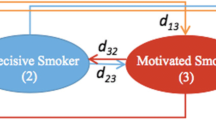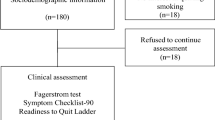Abstract
Background: A stage model of health behaviour change assumes homogeneity within the stages, in terms of how predictors relate to stage progression. It is not known whether this assumption is valid for the Transtheoretical Model (TTM) stages of change. Purpose: To test the homogeneity of the precontemplation stage of the TTM for smoking cessation. We hypothesized that if there was any discontinuity in prediction, it would be most likely to occur around a question which made a distinction between those who were “happy to smoke for the rest of their life” and those who “should quit, but are not currently thinking about it.” Method: Repeated measures design with telephone surveys conducted two weeks apart. Participants were 370 randomly selected precontemplators aged 18–40 years. Results: Evidence of discontinuity in prediction was found within the precontemplation stage, but across a different split point than expected. More predictive power of a multivariate model was found among smokers who stated they were not interested in quitting, with this at least in part due to “wanting to smoke,” than was found when the model was run on the overall sample. Conclusion: The study supported a possible discontinuity in prediction within the precontemplation stage, suggesting that the stage may not be uniform. Further research is required to confirm whether there is a discontinuity and, if so, to determine its precise location and identify the predictors for which there is a difference.
Similar content being viewed by others
References
Baron, R. M., & Kenny, D. A. (1986). The moderator-mediator variable distinction in social psychological research: Conceptual, strategic and statistical considerations. Journal of Personality and Social Psychology, 51, 1173–1182.
Borland, R., & Balmford, J. (2003). Understanding how mass media campaigns impact on smokers. Tobacco Control, 12(Suppl. II), ii45-ii52.
Borland, R., & Balmford, J. (2005). Perspectives on relapse prevention: An exploratory study. Psychology and Health, 20, 661–671.
Borland, R., Segan, C., & Velicer, W. F. (2000). Testing the Transthe-oretical Model for smoking change: Victorian data. Australian Journal of Psychology, 52, 83–88.
Borland, R., Yong, H.-H., King, B., Cummings, K. M., Fong, G. T., Elton, T. E., et al. (2004). Use of and beliefs about ‘light’ cigarettes in four countries: Findings from the International Tobacco Control Policy Evaluation Survey. Nicotine and Tobacco Research, 6(Suppl. 3), S311-S321.
Crittenden, K. S., Manfredi, C., Lacey, L., Warnecke, R., & Parsons, J. (1994). Measuring readiness and motivation to quit smoking among women in public health clinics. Addictive Behaviors, 9, 497–507.
De Vet, E., Brug, J., De Nooijer, J., Dijkstra, A., & De Vries, N. K. (2005). Determinants of forward stage transition: A Delphi study. Health Education Research, 20, 195–205.
DiClemente, C. C., Prochaska, J. O., & Gilbertini, M. (1985). Self-efficacy and the stages of self-change of smoking. Cognitive Therapy and Research, 9, 181–200
DiClemente, C. C., Prochaska, J. O., Fairhurst, S. K., Velicer, W.F., Velasquez, M. M., & Rossi, J.S. (1991). The process of smoking cessation: An analysis of precontemplation, contemplation and preparation stages of change. Journal of Consulting and Clinical Psychology, 59, 295–304.
Dijkstra, A., Bakker, M., & DeVries, H. (1997). Subtypes within a sample of precontemplating smokers: A preliminary extension of the stages of change. Addictive Behaviors, 22, 327–337.
Dijkstra, A., & De Vries, H. (2000). Clusters of precontemplating smokers defined by the perception of the pros, cons and self-efficacy. Addictive Behaviors, 25, 373–385.
Etter, J.-F., Perneger, T. V., & Ronchi, A. (1997). Distributions of smokers by stage: International comparison and association with smoking prevalence. Preventive Medicine, 26, 580–585.
Fong, G. T., Hammond, D., Laux, F. L., Zanna, M. P., Cummings, K. M., Borland, R., & Ross, H. (2004). The near-universal experience of regret among smokers in four countries: Findings from the International Tobacco Control Policy Evaluation Survey. Nicotine and Tobacco Research, 6(Suppl. 3), S341-S351.
Herzog, T. A., Abrams, D. B., Emmons, K. M., Linnan, L.A., & Shadel, W. G. (1999). Do processes of change predict smoking stage movements? A prospective analysis of the transtheoretical model. Health Psychology, 18, 369–375.
Jarvis, M.J. (2003). Epidemiology of cigarette smoking and cessation. Journal of Clinical Psychiatry Monographs, 18, 6–11.
Kraft, P., Sutton, S.R., & McCreath-Reynolds, H. (1999). The trans-theoretical model of behavior change: Are the stages qualitatively different? Psychology and Health, 14,433–450.
Menard, S. (1995). Applied logistic regression analysis (Sage University paper series on Quantitative Applications in the Social Sciences, series No. 07-106). Thousand Oaks, CA: Sage.
Norman, G. J., Velicer, W. F., Fava, J.L., & Prochaska, J.O. (2000). Cluster subtypes within stage of change in a representative sample of smokers. Addictive Behaviors, 25, 183–204.
Oakes, W., Chapman, S., Borland, R., Balmford, J., & Trotter, L. (2004). Bulletproof skeptics in life’s jungle: Which self-exempting beliefs about smoking most predict lack of progression toward quitting. Preventive Medicine, 39, 776–782.
Peto, R. (1994). Smoking and death: The past 40 years and the next 40. British Medical Journal, 309, 937–939.
Prochaska, J. O., DiClemente, C. C., & Norcross, J. C. (1992). In search of how people change: Applications to addictive behaviors. American Psychologist, 47,1102–1114.
Prochaska, J. O., DiClemente, C. C., Velicer, W. F., Ginpil, S., & Norcross, J. C. (1985). Predicting change in smoking status for self-changers. Addictive Behaviors, 10, 395–406.
Segan, C. J., Borland, R., & Greenwood, K. M. Do Transtheoretical Model measures predict forward stage transitions among smokers calling a Quitline? Manuscript submitted for publication.
Sutton, S. (2000). Interpreting cross-sectional data on stages-of-change. Psychology and Health, 15, 163–171.
Sutton, S. (2001). A critical review of the Transtheoretical Model applied to smoking cessation. In P. Norman, C. Abraham, & M. Conner (Eds.). Understanding and changing health behaviour: From health beliefs to self-regulation. Reading, UK: Harwood Academic Press.
Sutton, S. (2005). Stage theories of health behaviour. In M. Conner & P. Norman (Eds.), Predicting health behaviour: Research and practice with social cognition models (2nd ed.). Buckingham, UK: Open University Press.
Velicer, W. F., Fava, J. L., Prochaska, J. O., Abrams, D. B., Emmons, K. M., & Pierce, J. P. (1995a). Distribution of smokers by stage in three representative samples. Preventive Medicine, 24, 401–411.
Velicer, W. F., Hughes, S. L., Fava, J. L., Prochaska, J. O., & DiClemente, C. C. (1995b). An empirical typology of subjects within stage of change. Addictive Behaviors, 20, 299–320.
Warner, K. E., & Burns, D. M. (2003). Hardening and the hardcore smoker: Concepts, evidence and implications. Nicotine and Tobacco Research, 5, 37–48.
Weinstein, N. D., Rothman, A. J., & Sutton, S. R. (1998). Stage theories of health behavior: Conceptual and methodological issues. Health Psychology, 17, 290–299.
Yong, H.-H., Borland, R., & Siahpush, M. (2005). Quitting-related beliefs, intentions and motivations of older smokers in four countries: Findings from the International Tobacco Control Policy Evaluation Survey. Addictive Behaviors, 30, 777–788.
Author information
Authors and Affiliations
Corresponding author
Additional information
This work was supported by a postgraduate scholarship (Award Reference No. PP 02M 0899) from the National Heart Foundation of Australia to the first author and from an unrestricted educational research grant from Glaxo-SmithKline through the Australian Smoking Cessation Consortium. The authors would also like to acknowledge Fiona Newton for her thoughtful comments on an earlier draft.
Rights and permissions
About this article
Cite this article
Balmford, J., Borland, R. & Burney, S. Exploring discontinuity in prediction of smoking cessation within the precontemplation stage of change. Int. J. Behav. Med. 15, 133–140 (2008). https://doi.org/10.1080/10705500801929759
Issue Date:
DOI: https://doi.org/10.1080/10705500801929759




